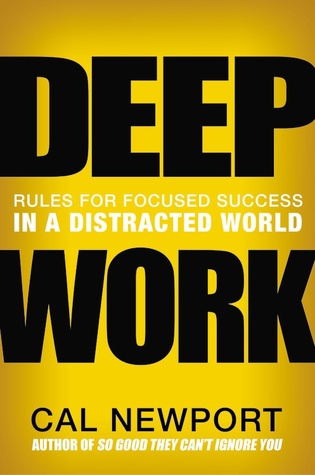This book had been recommended on podcasts a number of times over the years, but it wasn’t until one of the consultants I have hired to assist me with my business suggested I read it to get over my excuse making about being so busy I couldn’t spend enough time on marketing.
The secondary title is: Rules For Focused Success In A Distracted World.
Here are some excerpts from this books jacket, “Deep work is the ability to focus without distraction on a cognitively demanding task. It’s a skill that allows you to quickly master complicated information and produce better results in less time…Most people have lost the ability to go deep -spending their days instead in a frantic blur of e-mail and social media, not even realizing there’s a better way.”
The book is divided into two parts, first the author makes the case that in almost any profession, cultivating a deep work ethic will produce massive benefits. Then he presents a rigorous training regimen for transforming your mind and habits to support this skill.
There is a lot of nuances to these concepts and skills, but below find my notes from this book, as well as some of my own comments marked with an *.
Deep Work: Professional activities performed in a state of distraction-free concentration that push your cognitive capabilities to their limit. These efforts create new value, improve your skill, and are hard to replicate.
Shallow Work: Noncognitively demanding, logistical-style tasks, often performed while distracted. These efforts tend to not create much new value in the world and are easy to replicate.
The Deep Work Hypothesis: The ability to perform deep work is becoming increasingly rare at exactly the same time it is becoming increasingly valuable in our economy. As a consequence, the few who cultivate this skill, and then make it the core of their working life, will thrive. *I am questioning if the current education model fosters this at all?
Two Core Abilities for Thriving in the New Economy
1. The ability to quickly master hard things.
2. The ability to produce at an elite level, in terms of both quality and speed.
These two core abilities depend on your ability to perform deep work. To do this you need a deliberate practice: 1. Your attention is focused tightly on a specific skill you’re trying to improve or an idea you’re trying to master, 2. You receive feedback so you can correct your approach to keep your attention exactly where it’s most productive.
High Quality Work Produced = (Time Spent) x (Intensity of Focus)
The type of work that optimizes your performance is deep work. *I am all about performance for myself, family and clients.
The Principle of Least Resistance: In a business setting, without clear feedback on the impact of various behaviors to the bottom line, we will tend toward behaviors that are easiest in the moment. *This is so true from my past corporate employee experiences.
If email were to move to the periphery of your workday, you’d be required to deploy a more thoughtful approach to figuring out what you should be working on and for how long.
Busyness as Proxy for Productivity: In the absence of clear indicators of what it means to be productive and valuable in their jobs, many knowledge workers turn back toward an industrial indicator of productivity: doing lots of stuff in a visible manner.
Your world is the outcome of what you pay attention to, so consider for a moment the type of mental world constructed when you dedicate significant time to deep endeavors. *This makes me think about the message many consume from mainstream media and their fear narrative?
Human beings are their best when deeply immersed (In Flow State) in something challenging.
Rule #1 – Work Deeply
-You have a finite amount of willpower that becomes depleted as you use it.
-Maximize deep efforts by eliminating or radically minimizing shallow obligations.
-The easiest way to consistently start deep work sessions is to transform them into a simple regular habit: Where you will work and for how long? How you’ll work once you start to work? How you’ll support your work? These questions will help you get started in crafting your deep work ritual. *Building habits and routine comes up often with most of my clients.
-Discipline #1: Focus on the Wildly Important
-Discipline #2: Act on the Lead Measures
-Discipline #3: Keep a Compelling Scoreboard
-Discipline #4: Create a Cadence of Accountability
-You need down time to aid insights, recharge the energy needed to work deeply, the work downtime replaces is usually not that important. *Recovery, whether physical or mental is one area I see high achievers often failing at.
Rule #2 – Embrace Boredom
-Don’t take breaks from distraction. Instead take breaks from focus.
-Regardless of how you schedule your internet blocks, you must keep the time outside these blocks absolutely free from internet use.
-Scheduling internet use at home as well as at work can further improve your concentration training
-Meditate productively *Something I do daily and suggest for all my clients as well.
Rule #3 – Quit Social Media
The Any-Benefit Approach to Network Tool Selection: You’re justified in using a network tool if you can identify any possible benefit to its use, or anything you might possibly miss out on if you don’t use it.
The Craftsman Approach to Tool Selection: Identify the core factors that determine success and happiness in your professional and personal life. Adopt a tool if its positive impacts on these factors substantially outweigh its negative impacts. *I will admit this is a work in progress for me.
The Law of the Vital Few (Pareto’s Law, 80/20 Law): In many settings, 80 percent of a given effect is due to just 20 percent of the possible causes.
-Don’t use the internet as an entertainment tool
Rule #4 – Drain the Shallows
-Schedule every minute of your work day. Without structure, it’s easy to allow your time to devolve into the shallow (email, social media, web surfing).
-The motivation for this strategy is the recognition that a deep work habit requires you to treat your time with respect.
-Ask your boss for a shallow work budget. What percentage of my time should be spent on shallow work? *I wish I would have known and asked for this when I was in the corporate world.
-Become Hard to Reach
Tip #1: Make people who send you email do more work. Use sender filters.
Tip #2: Do more work when you send or reply to emails.
Tip #3: Don’t Respond
I think this is a book many people could benefit from reading, and I just noted some high-level notes I took on it. I am all about optimizing performance in all areas of life for myself and my clients, so if you want to be a High Performer in Health or Business you likely will get something from this book.
If you would like to discuss more, contact me here.




